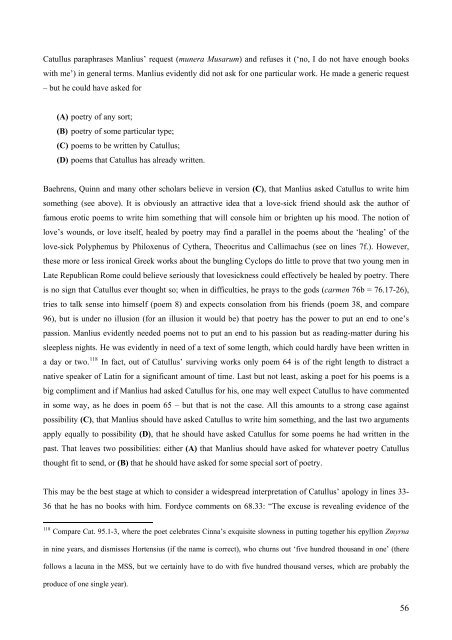CATULLUS 68 - Scuola Normale Superiore
CATULLUS 68 - Scuola Normale Superiore
CATULLUS 68 - Scuola Normale Superiore
You also want an ePaper? Increase the reach of your titles
YUMPU automatically turns print PDFs into web optimized ePapers that Google loves.
Catullus paraphrases Manlius’ request (munera Musarum) and refuses it (‘no, I do not have enough books<br />
with me’) in general terms. Manlius evidently did not ask for one particular work. He made a generic request<br />
– but he could have asked for<br />
(A) poetry of any sort;<br />
(B) poetry of some particular type;<br />
(C) poems to be written by Catullus;<br />
(D) poems that Catullus has already written.<br />
Baehrens, Quinn and many other scholars believe in version (C), that Manlius asked Catullus to write him<br />
something (see above). It is obviously an attractive idea that a love-sick friend should ask the author of<br />
famous erotic poems to write him something that will console him or brighten up his mood. The notion of<br />
love’s wounds, or love itself, healed by poetry may find a parallel in the poems about the ‘healing’ of the<br />
love-sick Polyphemus by Philoxenus of Cythera, Theocritus and Callimachus (see on lines 7f.). However,<br />
these more or less ironical Greek works about the bungling Cyclops do little to prove that two young men in<br />
Late Republican Rome could believe seriously that lovesickness could effectively be healed by poetry. There<br />
is no sign that Catullus ever thought so; when in difficulties, he prays to the gods (carmen 76b = 76.17-26),<br />
tries to talk sense into himself (poem 8) and expects consolation from his friends (poem 38, and compare<br />
96), but is under no illusion (for an illusion it would be) that poetry has the power to put an end to one’s<br />
passion. Manlius evidently needed poems not to put an end to his passion but as reading-matter during his<br />
sleepless nights. He was evidently in need of a text of some length, which could hardly have been written in<br />
a day or two. 118 In fact, out of Catullus’ surviving works only poem 64 is of the right length to distract a<br />
native speaker of Latin for a significant amount of time. Last but not least, asking a poet for his poems is a<br />
big compliment and if Manlius had asked Catullus for his, one may well expect Catullus to have commented<br />
in some way, as he does in poem 65 – but that is not the case. All this amounts to a strong case against<br />
possibility (C), that Manlius should have asked Catullus to write him something, and the last two arguments<br />
apply equally to possibility (D), that he should have asked Catullus for some poems he had written in the<br />
past. That leaves two possibilities: either (A) that Manlius should have asked for whatever poetry Catullus<br />
thought fit to send, or (B) that he should have asked for some special sort of poetry.<br />
This may be the best stage at which to consider a widespread interpretation of Catullus’ apology in lines 33-<br />
36 that he has no books with him. Fordyce comments on <strong>68</strong>.33: “The excuse is revealing evidence of the<br />
118 Compare Cat. 95.1-3, where the poet celebrates Cinna’s exquisite slowness in putting together his epyllion Zmyrna<br />
in nine years, and dismisses Hortensius (if the name is correct), who churns out ‘five hundred thousand in one’ (there<br />
follows a lacuna in the MSS, but we certainly have to do with five hundred thousand verses, which are probably the<br />
produce of one single year).<br />
56






